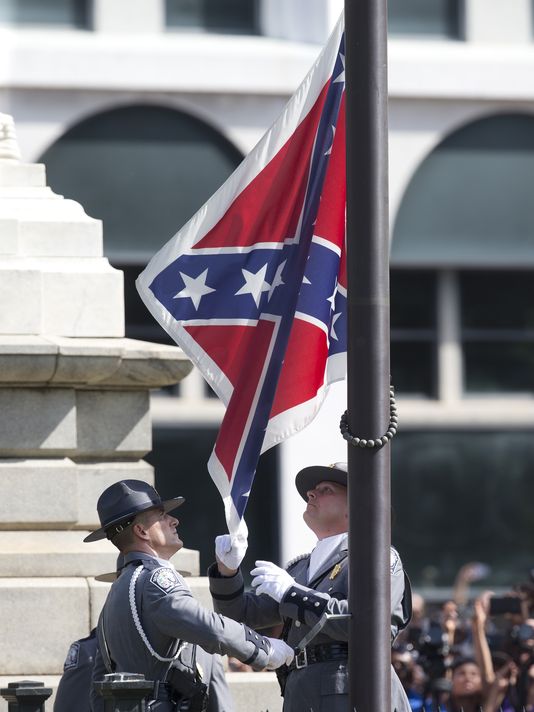 This morning, South Carolina finally removed the Confederate flag from the grounds of its statehouse. At long last, he rebel flag has finally fallen. Not everywhere, of course. But to see it go down here, in the cradle of rebellion, means one thing: it has lost its power to enthrall and intimidate. The cause is lost, and irretrievably.
This morning, South Carolina finally removed the Confederate flag from the grounds of its statehouse. At long last, he rebel flag has finally fallen. Not everywhere, of course. But to see it go down here, in the cradle of rebellion, means one thing: it has lost its power to enthrall and intimidate. The cause is lost, and irretrievably.
You can’t underestimate the power of a flag. We pledge allegiance not to the United States, but first to the flag, and only then to the republic for which it stands, an awfully curious construction when you think about it. We fight for flag and country, we capture the flag, the Giants win the pennant. “We stole countries with the cunning use of flags,’’ says the brilliant comedian Eddie Izzard, explaining how the British built an empire. “Just sail around the world and stick a flag in., [and say]”I claim India for Britain!” They’re going “You can’t claim us, we live here! Five hundred million of us!” “Do you have a flag …?’’ “We don’t need a bloody flag, it’s our country!” “No flag, no country, those are the rules that I’ve just made up. And I’m backing them up with this gun.’’ He may be underestimating the usefulness of that gun, but the point about the flag remains.
One hundred fifty years ago, the confederacy lost the civil war, but thanks to recalcitrance, clever public relations, and decades of state-sanctioned terrorism, it won the meaning of the war. In their minds, the south remained undefeated; they waged not a rebellion against the legitimate government but a war between states; they fought for freedom, not in support of slavery.
They did not fly the rebel battle flag that much then; they did not have to, at least not until after World War II, after Truman desegregated the armed forces and Eisenhower sent the 82nd Airborne to enforce the integration of the Little Rock schools and the Supreme Court declared an end to Separate but Equal. Only then did the confederate battle flag reappear, showing up on state houses and state flags. It did not return as a testimony to heritage or to the fallen soldiers of Shiloh and Chickamauga. It flew once again in defiance of democratic government, of constitutional law, of American principles of freedom and equality. But after the conflicts of the Civil Rights movement—one of the greatest triumphs of our history—the flag was once again fling on the losing side of history.
What did it mean that the confederate flag continued to fly? It meant that anyone who sympathized with any of its principles had a claim to legitimacy. He could claim to be part of a movement, a believer in a cause, the heir to a legacy worth protecting. A government was irrelevant, territory beside the point—if you have a flag, you have approval, you have an Us to stand with as you face up to the Them.
But now the flag has come down in South Carolina. It came down in the place that was always the home of the most fiery of the fire eaters, the first state to cite nullification, the first state to secede from the union, the first place where rebels fired on the flag of the United States. Going forward, there will always be diehards and dead enders who will never give up, but now they will be scattered and isolated. The moment the rebel flag was lowered, the confederacy no longer had any pretense to a home, to a heritage, to a place in American life.
The Lost Cause has at long last been lost.
